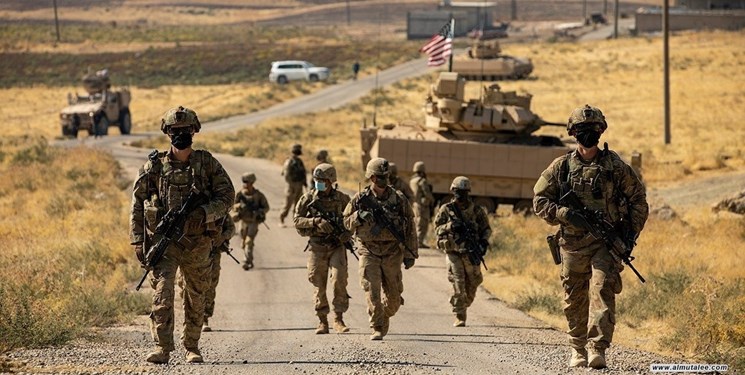Recently, “CBS News” announced that the United States is looking to send 1,500 troops from the New Jersey Army National Guard to Iraq and Syria under the so-called fight against ISIS. The deployment of these forces, which is considered the largest deployment of forces from this state to the region since 2008, is in the framework of the so-called “Steady Will” operation of the United States against ISIS, which is carried out with the claim of fighting ISIS and defending American bases.
The increase of American military forces in Iraq is not only against the approval of the Parliament but also basically a “violation of national sovereignty and territorial integrity” of Iraq. It is worth mentioning that on January 5, 2020 the Iraqi Parliament, holding a meeting on the expulsion of American troops from the country, unanimously approved a plan according to which all American troops must leave the country.
So far, the non-compliance of the US government has been the main obstacle in implementing the resolution mentioned above. But the indifference and failures of the White House never meant abandoning the resolution of the Iraqi Parliament, and this demand is still raised in Iraq that American forces should leave the country as quickly as possible.
In this regard, the Prime Minister of Iraq’s latest statement on January 20, 2024, emphasized that “the justifications for the continued presence of the US-led coalition have disappeared with the development of the capabilities of our security forces.” He added that in ending the coalition’s mission, it is necessary to maintain good relations between Iraq and the member countries of this coalition.
The number of American troops in Iraq is estimated to be around 2,500 people, who are stationed in different parts of the country, especially in Baghdad and northern Iraq.
Regarding the goals of increasing the American military forces in Iraq, two categories of “declarative” and apparent goals and “practical” and real goals can be identified.
Declared goals: These goals can be extracted from American officials’ statements in justifying their military actions in Iraq. Combating ISIS in Operation Firm Will, which is implemented in the three countries of Iraq, Syria, and Libya, defending American bases, helping and advising Iraqi forces, and similar issues are among the declared goals.
Real goals: The fact is that strengthening the US military presence in Iraq and Syria, contrary to what the US government declares, has “suspicious goals” and should be taken into consideration. While America claims that the fight against ISIS is one of the main goals, according to a report recently published by the Ministry of Foreign Affairs, ISIS attacks in 2023 have decreased by 80% in Iraq and 68% in Syria compared to 2022.
Therefore, the question is, in a situation where ISIS is no longer a threat to Iraq and even Syria, it has lost a large part of its existence. The trend of its threats is decreasing; what is the need for a so-called international coalition led by the United States to counter ISIS?
The army and the popular forces, especially the Hashd al-Shaabi in Iraq, can provide the security of this country well, and Baghdad has also taken suitable measures in the past years in terms of providing military equipment and strengthening its security infrastructure; therefore, despite all this situation it is natural
that boosting the US military presence in Iraq would lead to nothing but the spread of “insecurity and instability.”
Today, the highest level of insecurity and instability in Iraq is in the areas where American troops and bases are present. This issue shows that America, contrary to its claims, is the “main cause” of disruption in the security, political, and even economic processes of Iraq and Syria.
By increasing the military presence in Iraq and Syria, which the arms cartels also desire, the White House pursues important goals, which is to maintain its influence in the target countries, especially Iraq and Syria, to weaken the Resistance front (where Iraq and Syria are the two leading countries in this front) ), booming arms sales market, exploiting oil and gas resources and fields, revitalizing separatist projects, blackmailing these countries and making the region insecure are among its real goals.
In addition, the US government has turned the recent developments in the region into an opportunity to strengthen its military presence in the region. The war in Gaza and the recent developments in the Red Sea clearly show that the American military and security apparatus in the Arab region have dimensions and goals beyond the fight against ISIS and their eradication.
Therefore, it is pretty clear that the effort of the Biden administration to increase the military presence in Iraq and Syria, along with unjustified attacks on Yemen, is in the direction of the old and well-known American policy of “destabilizing the region.” Insecurity and instability are the “center of gravity” of US strategies in the region to facilitate the process of political, economic, security, and military exploitation. In fact, the nature of American regional strategy is such that they work better in an insecure, unstable, and aggressive environment than in a stable situation.
Therefore, it is expected that the Arab governments and nations, especially the political groups and currents in Iraq, who sometimes have differences regarding the American military presence in their country, will be vigilant in this regard because the least consequence of strengthening the American military presence in each of the Arab countries is the spread of instability and insecurity, the consolidation of the depth and range of threats against national security and as a result disruption of economic and political development programs and plans.










0 Comments